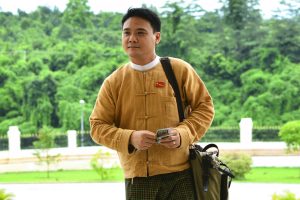Myanmar’s military government has followed through on its plan to execute four political prisoners, including a former lawmaker from the ousted civilian government, which it accused of carrying out “terror acts.”
In a chillingly brief, four-sentence-long report published this morning, the state-run Global New Light of Myanmar stated that prison authorities had carried out the death sentences against Phyo Zeyar Thaw, a lawmaker in the ousted National League for Democracy (NLD) government, veteran pro-democracy activist Ko Jimmy, and two other men.
It said that the four “gave directives, made arrangements, and committed conspiracies for brutal and inhumane terror attacks,” concluding that “the punishment has been carried out under the prison’s procedures.” It did not elaborate on the date or method of execution, though it is widely assumed that the four men were hanged.
Phyo Zeyar Thaw, Ko Jimmy, and the other two men – Hla Myo Aung and Aung Thura Zaw – were sentenced to death in a closed-door trial in January, after being convicted of violating the country’s counterterrorism law by helping newly formed civilian militias fight the military junta that seized power last February.
The four were among around 114 people who have been sentenced to death by military tribunals since the coup for opposing the military junta. While the military has historically carried out very few of the death sentences that it has imposed, the junta announced last month that the group’s appeals had been rejected and that it planned to carry out the executions.
When asked for comment by Voice of Myanmar, a local media outlet, junta spokesperson Zaw Min Tun refused to elaborate further. “It is as stated in the newspaper,” he said. “I will not mention about this in the news conference. This is according to the law and no need to explain.”
This morning’s executions, the first to be carried out in Myanmar since the late 1980s, marked a dramatic escalation and Rubicon-crossing on the part of the junta – a signal to those opposing the military’s rule of the lengths to which it is willing to go in order to safeguard its coup. They also provided a grotesque reflection of the military’s own self-image, as the embodiment of the Myanmar nation and the sole arbiter of its fate. Above all, they signaled its profound disdain and contempt for international opinion, which is likely to push military-ruled Myanmar further into the isolation from which it emerged a decade ago.
The killings prompted an immediate outcry. A spokesperson for the opposition National Unity Government said that it was “extremely shocked & saddened” to hear of the executions, and said that the world “must punish murderous #Myanmar military junta for their cruelty and killings.”
The advocacy group Amnesty International described the killings as marking an “atrocious escalation in state repression.” Its counterpart Human Rights Watch said they were “an act of utter cruelty” – one that was compounded by the military’s failure to notify the men’s families, “who learned about the executions through the junta’s media reports.”
“I am outraged and devastated at the news of the junta’s execution of Myanmar patriots and champions of human rights and democracy,” Tom Andrews, the United Nations special rapporteur on human rights in Myanmar, said in a statement. Richard Horsey, an independent analyst who consults on Myanmar for the International Crisis Group, called it an “outrageous act” and “one that will create political shockwaves, now and for a long time to come.”
As some observers noted, the decision is also a slap in the face of current Association of Southeast Asian Nations (ASEAN) chair Cambodia and its prime minister, Hun Sen, who urged the military not to carry out the planned executions. In a letter to Senior Gen. Min Aung Hlaing last month, Hun Sen suggested that the move would further isolate the junta and throw up further obstacles to the restoration of peace – both of which are no doubt true.
While the executions are clearly intended to intimidate the Myanmar public into silence and acquiescence, they will greatly inflame the situation in the country, snuffing out the dim chance of a negotiated exit from its present conflict. They could also be the prelude to a wider state-sanctioned blood-letting, given the dozens of political prisoners that the junta is still holding on death row.
The move will clearly lead the Western democracies to double down on their policy of sanctions and isolation, but the question is whether this nudges Myanmar’s neighbors to toughen their stance. For Cambodia and its special envoy, foreign minister Prak Sokhonn, who have spent the last eight months slowly learning that the military has chosen its path and is determined to see it through to the undoubtedly bitter and bloody end, this event should lead to a reset of expectations and strategy. The same is true of other neighboring countries, particularly India and Thailand, which have continued to deal with the military administration, despite the increasing tumult that has attended its 18 unsteady, sanguinary months in power.
Whatever the response of foreign governments, these executions have the potential to be a turning point in the country’s post-coup struggle. The military junta clearly intends the executions to signal its strength and prowess. Only time will tell whether it turns out to be a miscalculation.

































